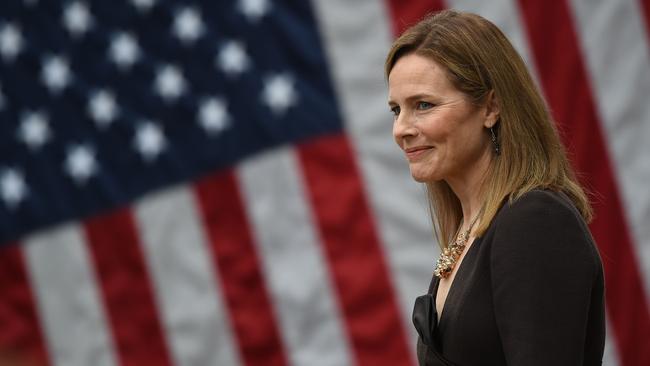US Supreme Court to hear challenge to Roe v Wade
The US Supreme Court has agreed to examine a ban on most abortions after 15 weeks in the biggest challenge to Roe v Wade in a generation.

The US Supreme Court has agreed to examine a ban on most abortions after 15 weeks of pregnancy in a case seen as the biggest challenge in a generation to the landmark Roe v Wade case that gave women the choice.
It is the first substantial abortion case to be heard by the court after its conservative majority increased to 6-3 with the addition of Amy Coney Barrett, who campaigned against abortion earlier in her career.
The ruling, expected next year, could allow states to ban abortion before the foetus is viable outside the womb, upending the legal precedent set by Roe v Wade in 1973.
The case was brought in the name of Thomas Dobbs, the state health officer of Mississippi. If the Supreme Court upholds the Mississippi law then a dozen states would rush to enact similar measures and also pass tighter controls to test if the justices would move further to erode the Roe v Wade standard.
“Alarm bells are ringing loudly about the threat to reproductive rights,” said Nancy Northup, president of the Centre for Reproductive Rights, which is among those challenging the Mississippi law. “The Supreme Court just agreed to review an abortion ban that unquestionably violates nearly 50 years of Supreme Court precedent.”
The Roe v Wade judgment stopped states from banning abortions in the first trimester but allowed some regulations in the second trimester providing they did not place an “undue burden” on women. It was modified in 1992 in a case that confirmed access to abortion in every state up until the “viability” of the foetus at about 24 weeks.
The 2018 Mississippi law was enacted with the goal of making a direct challenge to Roe v Wade.
Jackson Women’s Health Organisation, the only abortion clinic in Mississippi, sued to block the move and a federal judge ruled against the state in 2018. The New Orleans-based 5th Circuit Court of Appeals reached the same conclusion in 2019, prompting the state to appeal to the Supreme Court. “States may regulate abortion procedures prior to viability so long as they do not impose an undue burden on the woman’s right, but they may not ban abortions,” Patrick Higginbotham, the 5th circuit judge, wrote.
Bans on pre-viability abortion have been struck down in a dozen states since 2019. But rather than accept the appeal court verdict, the Supreme Court decided to take up the case itself, a move that requires the approval of four of the nine justices.
The White House said that President Joe Biden remained committed to his election campaign pledge to codify Roe v Wade in law notwithstanding the outcome of the latest case. In June last year the Supreme Court, in a 5-4 ruling, struck down an abortion law in Louisiana that imposed restrictions on doctors who performed the procedure. John Roberts, the conservative Chief Justice, voted with the court’s liberal wing. Chief Justice Roberts, however, made it clear that he voted the way he did because he felt bound by a 2016 ruling that struck down a similar law in Texas.
Donald Trump promised during the 2016 presidential race to appoint justices who would overturn Roe v Wade. The Louisiana case marked the court’s first big abortion decision since Mr Trump appointed Neil Gorsuch in 2017 and Brett Kavanaugh in 2018 as justices. Both voted in favour of Louisiana’s restrictions. If Justice Barrett were to vote on similar lines conservatives would have a majority to curb abortion rights.
The Mississippi law would allow exceptions to the 15-week ban in cases of medical emergency or severe foetal abnormality. Doctors who breached the ban would face suspension or have their medical licence revoked.
The Times


